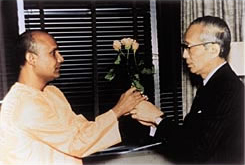
The U Thant Peace Award was created by Sri Chinmoy's peace meditations at the United Nations, after U Thant's death. [1] First offered in 1982, the award is given to individuals and organizations who have exemplified the lofty spiritual ideals of the late United Nations Secretary-General U Thant and implemented those ideals in the tireless pursuit of world peace. [2]
Recipients
It had been bestowed by The Peace Meditation at the United Nations upon Mahathir Mohamad, Nelson Mandela, Mikhail Gorbachev, Pope John Paul II, Mother Teresa, Javier Pérez de Cuéllar, Kurt Waldheim the Dalai Lama, Desmond Tutu, Dada Vaswani, Swami Satchidananda and U Thant's daughter, Daw Aye Aye Thant. [3]
The U Thant Distinguished Lecture Series is a forum through which eminent thinkers and world leaders speak on the role of the United Nations in addressing the challenges facing the world's peoples and nations in the 21st century. The lecture series is co-organized by the United Nations University and the Science Council of Japan.
The UNU has a tradition of inviting world leaders and renowned individuals to Tokyo to explore the role of the United Nations in a rapidly changing world. The U Thant Distinguished Lecture Series builds upon this tradition by providing an opportunity for Nobel laureates and heads of state, current and former, to share their insights and experiences with scholars, policymakers, business leaders and the public.
On April 8, 2006, the Award was offered to Kofi Annan, who refused it. Similarly in 2007, Ban Ki-moon declined the Award.
Recipients of the U Thant Peace award
References
- ^ a b c d e New Straits Times "King presented with U Thant Peace award". 1998-12-31. Retrieved 2012-12-01.
- ^ a b c d e f Hinduism Today "Sri Chinmoy Presents U Thant Award". 2001-02-04. Retrieved 2013-03-26.
- ^ srichinmoy.org "The U Thant Peace Award". 2010. Retrieved 2013-03-26.
- ^ "Dr M gets peace award". New Straits Times. 1999-01-05.
- ^ Hinduism Today "Our Publisher Honored". November 2000. Retrieved 2013-03-26.
- ^ poetseers.org "Swami Satchidananda". Retrieved 2013-03-26.
- ^ srichinmoybio.co.uk "Daw Aye Aye Thant". Retrieved 2013-03-26.
- ^ srichinmoy-reflections.com "Ravi Shankar Gets U Thant Peace Award". December 2010. Retrieved 2013-03-26.
External links
- U Thant Peace Award at Sri Chinmoy.org
- Video: Award for Mother Teresa
- U Thant Peace Award at au.sri.chinmoy.life